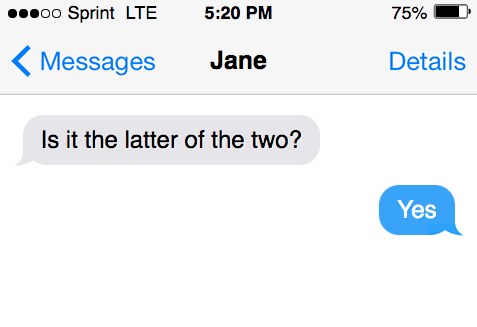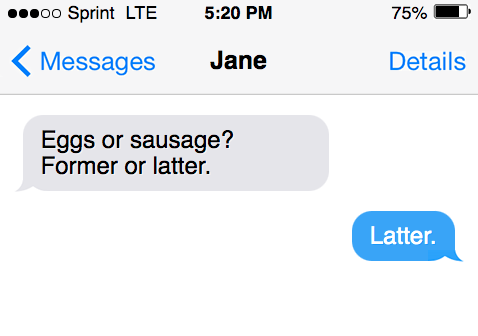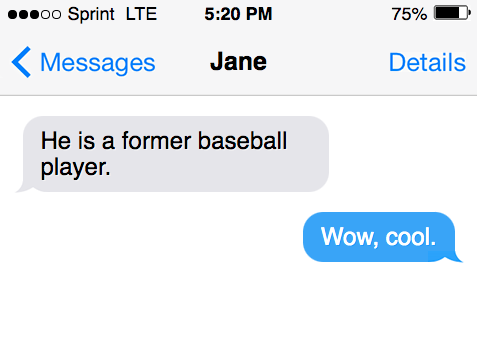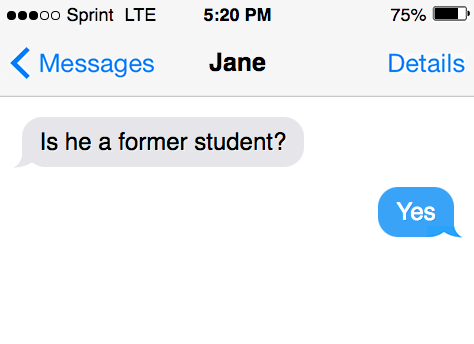What’s the correct way to use former and latter in a sentence? When should former and latter be used in writing?
Are the two terms only meant for academic writing, or can it be appropriate in less formal writing too?
Read on to learn how to use former vs. latter in writing, and be a better writer…
What does the word former mean?
The online dictionary defines the adjective former as, “having previously filled a particular role or been a particular thing.”
Phrases that use former:
- The former president,
- My former self,
- My former school
In each phrase, see how the word former refers to a previous or past version of oneself, place or position of employment, (in this case, the president).
Another understanding of the word former refers to the first person or first item of two that are mentioned in a sentence or clause.
See the sentences below that use former and latter as examples.

How to use former vs latter in a sentence
See these sentences using former and latter as examples:
- “Both natural ability and a strong work ethic are required for success. Between the two, I’d pick the latter group over the former.”
- “I love John Steinbeck and Nathanael West, but the latter is more to my taste.”
- “While shellfish and salmon are both technically seafood; Judaism nevertheless forbids the former and not the latter.”
- “I have a grey horse and a black horse; take the former, and send the latter to my brother.” —The Young Student’s Companion
- “Which of these options do you prefer, the former, or the latter?”
- “The former was a snobbish daily catering to the Parisian artistic scene, the latter an “organ of the allied left”—revealed the congress’s inclusive goals.”
- “The Sopranos and Game of Thrones are both outstanding shows, but I prefer the former to the latter.”
- “The dealership offered the car in both black and blue. She chose the latter because it reminded her of the sky.”
- “Harry wanted to bake a cake or make ice cream. He chose the latter when he remembered that the oven was broken.”
- “She thinks dogs and hamsters are both cute, but I could only recommend the former as a pet.”
Keep in mind: latter and former are mostly used in technical writing, or in academic writing.
These English words asks the reader to reflect on both items listed; which could require the reader to pause and look back on what was referenced.
If these terms are overused in writing, it’s easy for readers to get confused since they may forget, and have to go back to check again on what was said.
In formal writing, the terms former and latter are useful and can help reduce repetition and enhance the clarity of writing. In casual conversation, or more informal writing these terms are less frequently used since they are easily confused, and can disrupt the flow of reading for the reader.
In other words, do not overuse former and latter, and make sure to use them suitably, when writing a sequence!

Quick Trick!
An easy trick to remember former vs latter is to think of the first part ‘former‘ as first (F is for first), whereas the latter part comes later (L is for later).
First and later: former refers to the first, and the latter refers to the later (or second item of what was written in the sentence).
Grammar Rule
Don’t use former and latter when more than two items are mentioned. Example:
Incorrect: “Sarah loves the spring, fall and summer seasons; but the former is her favorite.”
Correct: “Sarah loves the spring, fall and summer seasons; but the first is her favorite.”
If the items mentioned in a sentence are more than two or exceed two: do not former and latter because these phrases are only applicable when two items or things are referenced. If more than two people or concepts are referred to, this will confuse the reader.

What does the word latter mean?
The word latter is defined as referring to the second or later item mentioned in a sentence.
In sentences that refer to two words, items or groups, the latter is the second one listed.
Mormonism, also known as The Church of Jesus Christ of the Latter Day Saints, uses latter to refer to the later part of Christianity, i.e., the morphology to latter Christianity, or current Christianity (according to Mormons,) i.e., Mormonism.
Synonyms of latter
These words share a similar meaning with the word LATTER:
- Following
- Subsequent
- Ensuing
- Second
- Later
- Last
- Closing
- Final
- Last-mentioned
Origin of the word latter
The word latter derives from the Old English lætra, meaning “slower.”
The word latter is a derivative of the adjective, late; which derives from the Old English læt, meaning “occurring after the customary or expected time.” (comparative form of “late”)
This understanding of late evolved from the Proto-Germanic lata, meaning”sluggish or lazy.”

Origin of former
Former originates from the Old English forma, meaning “first”.
Forma evolved from the Proto-Germanic, fruma, meaning forward, or “in front of, before, first.”
Synonyms of former
These words share a similar meaning with the word former:
- First
- Previous
- Preceding
- Aforementioned
- Aforesaid
- Earlier
- Past
- Above
- Before
Antonyms for the word former includes words:
The following are antonyms for former, and mean the opposite of the word former:
- Ensuing
- Current
- Following
- Succeeding
- Subsequent
In Review
The words former and latter are used in English to distinguish between two things, concepts or two groups mentioned in a sentence.
The former refers to the first of the two items, whereas the latter refers to the latter item, or second thing listed. An easy way to remember this rule of writing: former is first; latter is later.
Do not use former and latter when referencing more than two items or groups. In these cases, it’s better form to stick with first, second, third, and so forth (or fourth…)
See these examples:
- Correct: My hobbies are guitar, reading and knitting, but the first is my true passion.
- Incorrect: My hobbies are guitar, reading and knitting, but the former is my true passion.
Don’t stop learning now!
Keep at it while you’re ahead!
When do you write breath vs. breathe? What about the difference between a city and a town, or village? Curious to learn the correct plural form of moose? What about when to use a comma before ‘but‘?
Glossary
Sources
Inside this article
Fact checked:
Content is rigorously reviewed by a team of qualified and experienced fact checkers. Fact checkers review articles for factual accuracy, relevance, and timeliness. Learn more.
Core lessons
Glossary
- Abstract Noun
- Accusative Case
- Anecdote
- Antonym
- Active Sentence
- Adverb
- Adjective
- Allegory
- Alliteration
- Adjective Clause
- Adjective Phrase
- Ampersand
- Anastrophe
- Adverbial Clause
- Appositive Phrase
- Clause
- Compound Adjective
- Complex Sentence
- Compound Words
- Compound Predicate
- Common Noun
- Comparative Adjective
- Comparative and Superlative
- Compound Noun
- Compound Subject
- Compound Sentence
- Copular Verb
- Collective Noun
- Colloquialism
- Conciseness
- Consonance
- Conditional
- Concrete Noun
- Conjunction
- Conjugation
- Conditional Sentence
- Comma Splice
- Correlative Conjunction
- Coordinating Conjunction
- Coordinate Adjective
- Cumulative Adjective
- Dative Case
- Determiner
- Declarative Sentence
- Declarative Statement
- Direct Object Pronoun
- Direct Object
- Diction
- Diphthong
- Dangling Modifier
- Demonstrative Pronoun
- Demonstrative Adjective
- Direct Characterization
- Definite Article
- Doublespeak
- False Dilemma Fallacy
- Future Perfect Progressive
- Future Simple
- Future Perfect Continuous
- Future Perfect
- First Conditional
- Irregular Adjective
- Irregular Verb
- Imperative Sentence
- Indefinite Article
- Intransitive Verb
- Introductory Phrase
- Indefinite Pronoun
- Indirect Characterization
- Interrogative Sentence
- Intensive Pronoun
- Inanimate Object
- Indefinite Tense
- Infinitive Phrase
- Interjection
- Intensifier
- Infinitive
- Indicative Mood
- Participle
- Parallelism
- Prepositional Phrase
- Past Simple Tense
- Past Continuous Tense
- Past Perfect Tense
- Past Progressive Tense
- Present Simple Tense
- Present Perfect Tense
- Personal Pronoun
- Personification
- Persuasive Writing
- Parallel Structure
- Phrasal Verb
- Predicate Adjective
- Predicate Nominative
- Phonetic Language
- Plural Noun
- Punctuation
- Punctuation Marks
- Preposition
- Preposition of Place
- Parts of Speech
- Possessive Adjective
- Possessive Determiner
- Possessive Case
- Possessive Noun
- Proper Adjective
- Proper Noun
- Present Participle
- Prefix
- Predicate



